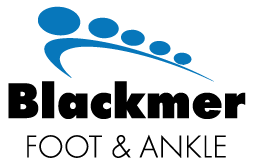Immediate Appointments Available

What Is an Ingrown Toenail?
When a toenail is ingrown the nail is usually curved and grows into the skin at one or both side borders. This “digging in” of the nail irritates the skin often creating pain, redness, swelling, and warmth in the toe.An infected ingrown toenail is often marked by drainage and a foul odor. However, even if the toe isn’t painful, red, swollen or warm, a nail that curves downward into the skin can progress to an infection.
Causes:
Heredity: In many people the tendency for ingrown toenails is inherited.
Trauma: Such trauma includes stubbing your toe, having an object fall on your toe, or engaging in activities that involve repeated pressure on the toes such as kicking or running.
Improper trimming: The most common cause of ingrown toenails is cutting your nails too short. This encourages the skin next to the nail to fold over the nail.
Improperly sized footwear: Ingrown toenails can result from wearing socks and shoes that are tight or short.
Nail Conditions: These include fungus toenails (onychomycosis) and psoriatic toenails.
Treatment:
Home Treatment: Sometimes initial treatment for ingrown toenails can be safely performed at home. However, home treatment is strongly discouraged if an infection is suspected, or for those who have medical conditions that put feet at high risk such as diabetes, nerve damage in the foot, or poor circulation. If you don’t have an infection or any of the above medical conditions, you can soak your foot in room-temperature water (adding Epsom’s salt may be recommended by your doctor), and gently massage the side of the nail fold to help reduce the inflammation. Avoid attempting “bathroom surgery". Repeated cutting of the nail can cause the condition to worsen over time. If your symptoms fail to improve, it’s time to make an appointment with our office.
Our Treatment: After examining the toe we will select the treatment best suited for you. If an infection is present, an oral antibiotic may be prescribed. For permanent correction, a minor procedure is performed in the office under a local anesthetic. This will ease the pain and remove a small portion of the nail border. Most often the involved nail border is removed, but at times the full toenail must be removed. Following the procedure, a light bandage will be applied allowing you to return to shoes. Most people experience very little or no discomfort after the procedure and may resume normal activity the next day. If Dr. Blackmer has prescribed an oral antibiotic please be sure to take all the medication even if your symptoms have improved. If you have had a bad experience with another provider for ingrown toenail surgery in the past, rest assured Dr. Blackmer will do his best to minimize your discomfort before, during and after the procedure. Dr. Blackmer has performed thousands of these procedures over his professional career.
Preventing Ingrown Toenails:
Proper trimming: Cut toenails in a fairly straight line, and don’t cut them too short. You should be able to get your fingernail under the sides and end of the nail.
Well-fitted shoes and socks: Don’t wear shoes that are short or tight in the toe area. Avoid shoes that are loose, because they too cause pressure on the toes, especially when running or walking briskly.
Don’t cut a notch in the nail: Contrary to what some people believe, this does not reduce the tendency for the nail to curve downward.
Don’t repeatedly trim nail borders: Repeated trimming does not change the way the nail grows, and can make the condition worse.
Don’t place cotton under the nail: Not only does this not relieve the pain, it provides a place for harmful bacteria to grow, resulting in infection.
Over-the-counter medications are ineffective: Topical medications may mask the pain, but they don’t correct the underlying problem.
Disclaimer: The advice on this website is not intended to substitute for a visit to your health care provider. We will not be held liable for any diagnosis made or treatment recommended. Consult your doctor if you feel you have a medical problem.
